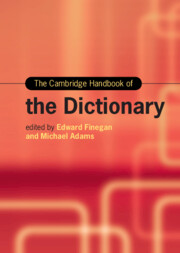Book contents
- The Cambridge Handbook of the Dictionary
- Cambridge Handbooks in Language and Linguistics
- The Cambridge Handbook of the Dictionary
- Copyright page
- Contents
- Figures
- Tables
- Contributors
- Acknowledgments
- Introduction
- Part I Types of Dictionaries
- Part II Dictionaries as Books
- Part III Dictionaries and Ideology
- Part IV Dictionaries and Domains of Use
- Chapter 20 Dictionary Audiences
- Chapter 21 Dictionaries and Intellectual History
- Chapter 22 Dictionaries and Social History
- Chapter 23 Linguistics and Philology in Dictionaries
- Chapter 24 Dictionaries as Literary Artifacts
- Chapter 25 Dictionaries and Editors
- Chapter 26 Lexicography and the Law
- Part V The Business of Dictionaries
- Part VI The Future of Dictionaries
- References: Dictionaries
- References: Secondary Works
- Index
Chapter 24 - Dictionaries as Literary Artifacts
from Part IV - Dictionaries and Domains of Use
Published online by Cambridge University Press: 19 October 2024
- The Cambridge Handbook of the Dictionary
- Cambridge Handbooks in Language and Linguistics
- The Cambridge Handbook of the Dictionary
- Copyright page
- Contents
- Figures
- Tables
- Contributors
- Acknowledgments
- Introduction
- Part I Types of Dictionaries
- Part II Dictionaries as Books
- Part III Dictionaries and Ideology
- Part IV Dictionaries and Domains of Use
- Chapter 20 Dictionary Audiences
- Chapter 21 Dictionaries and Intellectual History
- Chapter 22 Dictionaries and Social History
- Chapter 23 Linguistics and Philology in Dictionaries
- Chapter 24 Dictionaries as Literary Artifacts
- Chapter 25 Dictionaries and Editors
- Chapter 26 Lexicography and the Law
- Part V The Business of Dictionaries
- Part VI The Future of Dictionaries
- References: Dictionaries
- References: Secondary Works
- Index
Summary
Dictionaries are works of literature: they have an author, a plot, and a narrative. They have also been the object of fascination of writers–poets, novelists, and essayists– from diverse languages, from Ambrose Bierce, Jorge Luis Borges, Denis Diderot, and Gustave Flaubert, to Czeslaw, George Orwell, George Perec, William Thackery, and Voltaire. At times, the structure of a lexicon is emulated in a work of fiction; in others, it is at the heart of a storyline. This meditation explores the wide range of tributes dictionaries have occasioned as well as volumes about the making of specific lexicons, such as the Oxford English Dictionary.
- Type
- Chapter
- Information
- The Cambridge Handbook of the Dictionary , pp. 481 - 492Publisher: Cambridge University PressPrint publication year: 2024

